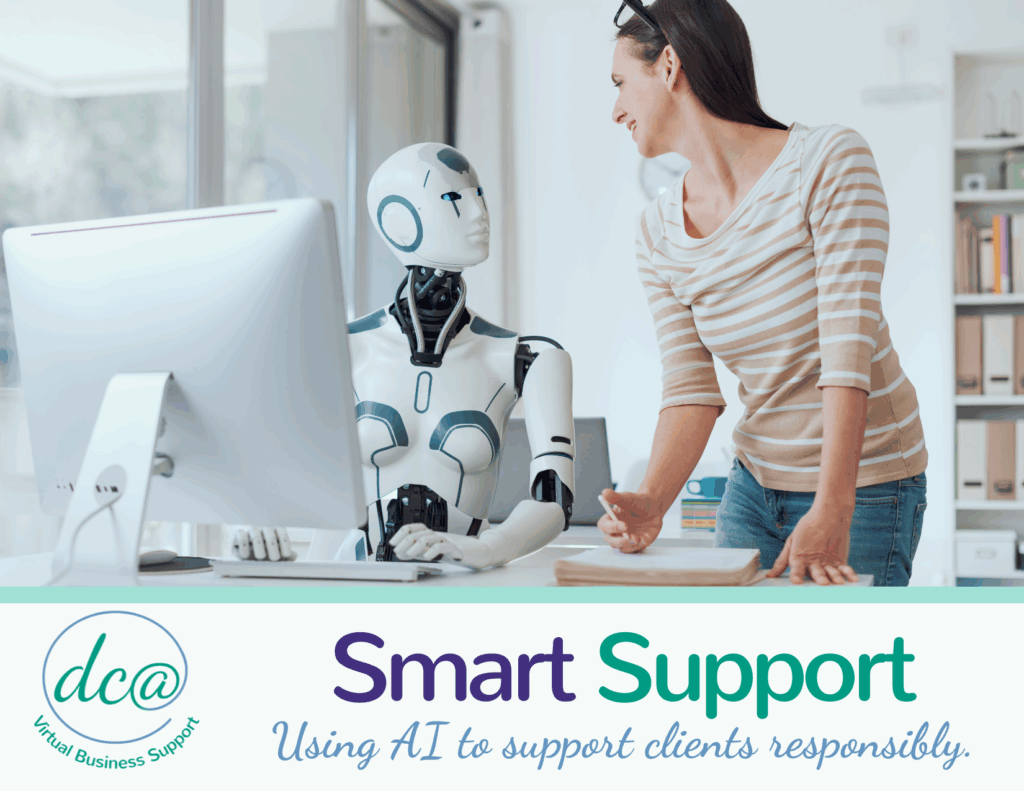
Smart Support for Impact: How DCA Virtual Business Support Uses AI (Responsibly!) to Serve Clients
At DCA Virtual Business Support, we believe in working smarter—not just harder. That’s why we’ve embraced artificial intelligence (AI) as a powerful ally in delivering efficient, high-quality support to our clients. But don’t worry—we haven’t handed the keys to the robots just yet. We’re still very much human (and proud of it), guided by a clear set of ethical principles that keep our AI use smart, safe, and client-focused.
Why AI? Why Now?
AI helps us streamline operations, spark creativity, and uncover insights faster than ever before. Whether it’s generating blog title ideas, refining marketing copy, or conducting research, AI allows our team to focus on what we do best: delivering personalized, high-impact support to our clients.
Here’s how we use AI at DCA:
- Summarize notes: AI helps us quickly distill meeting takeaways and action items.
- Create presentations: Whether it’s structuring content or sparking design ideas, AI is a helpful co-creator.
- Conduct research: From sales leads to white papers, AI makes research efficient..
- Transcribe audio: AI tools make it easy to turn spoken words into written records.
- Write and debug code: Yes, even virtual assistants need a little programming help sometimes.
- Generate ideas: Even if they don’t always work out, they often spark something better.
- Focus on efficiency: It’s not always about perfection—it’s about progress.
- Get suggestions for titles: Because sometimes, “Untitled Document 27” just doesn’t cut it.
How We Guide Our Team: The Do’s and the Don’ts
While we acknowledge how powerful and helpful AI tools can be in supporting both our business and our clients, it’s essential that our clients’ information remains protected and our ideas and systems retain a human touch. That’s why we’ve developed internal AI guidelines to ensure our use of this technology is thoughtful, secure, and aligned with our values.

Here are some of guidelines at DCA when utilizing AI:
The Do’s:
- Be specific: The more context we give AI, the better the results. Vague prompts lead to vague answers—and nobody wants that.
- Iterate and refine: The first output is rarely the best. Rework prompts and polish results until they’re aligned with your goal.
- Verify facts and sources: AI can suggest information, but human fact-checking ensures accuracy.
- Keep learning: AI is changing fast—stay curious and open to new tools, techniques, and ethical considerations.
The Don’ts:
- No names, no companies: We never input client names or sensitive data into public AI tools. Privacy is non-negotiable.
- No generic questions: We aim for clarity and purpose in every prompt.
- No copy-paste publishing: AI is a co-pilot, not the captain. We always review and refine before anything goes live.
- No buzzword bingo: If it sounds like a robot wrote it, we aren’t going to use it.
Ethics in Action
Our approach to AI is rooted in transparency, confidentiality, and a healthy dose of common sense. We understand the risks—plagiarism, misinformation, and the dreaded “sounding like everyone else”—and we actively work to avoid them. As our internal guidance puts it: “Let’s use AI responsibly.”
That includes understanding where and how we use AI tools. When you use public AI models, the information you input may be fair game for public consumption. But when you use company-specific and encrypted platforms like Copilot, your data is more protected. This distinction is critical to maintaining client confidentiality and upholding our ethical standards.
We also recognize that AI is evolving rapidly. What’s true today might not be tomorrow. That’s why we stay curious, stay cautious, and stay committed to learning.
The Human Touch
At the end of the day, AI is just a tool. It doesn’t replace our creativity, empathy, or judgment—it enhances them. Our clients come to us for smart support, and that means blending the best of technology with the best of human insight.
So yes, we use AI. But we also use our brains, our hearts, and occasionally, our sense of humor. Because at DCA, we believe that smart support isn’t just about efficiency—it’s about impact.
